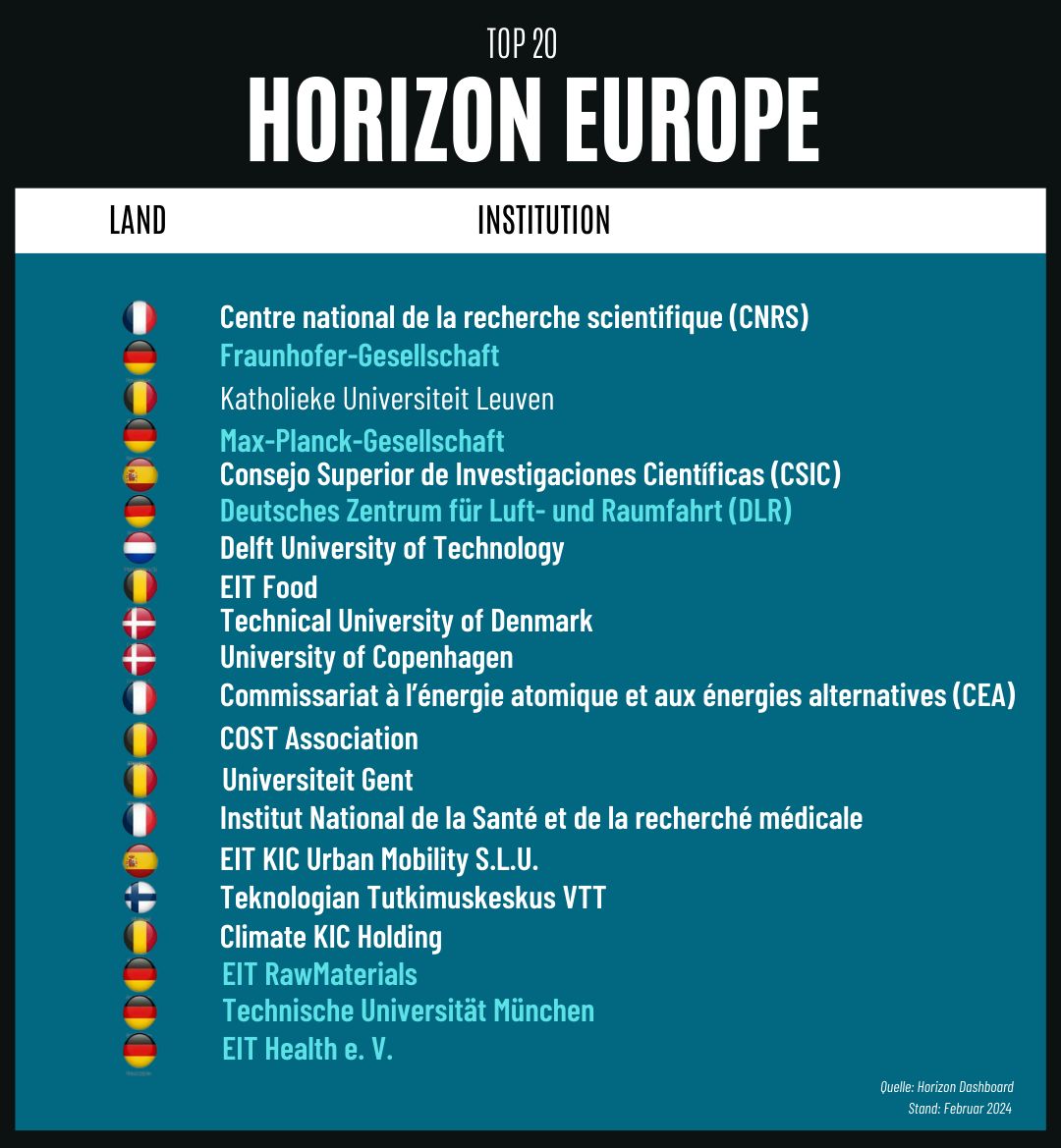
Looking back: Three years of Horizon Europe in figures

The data listed here is based on the latest figures from the Horizon Dashboard, which we analysed on 7 January 2024. So far, the EU Commission has disbursed EUR 30.07 billion or around 31.5% of the budget in the first three years of the seven-year programme (2021-2023). This roughly corresponds to the volume disbursed from Horizon 2020 at the same time.
Germany in first place among participating countries
With 16.3 per cent of all funds raised to date, Germany remains in first place among the participating countries. With almost 5 billion euros for German institutions, an absolute growth of around 1.5 billion euros was recorded compared to 2017 (three years after the start of Horizon 2020).
While the United Kingdom was still in second place in terms of EU funding received in 2017, this position is now occupied by France with a funding volume of 3.4 billion and a share of 11.4 per cent of the funding received to date.
Bavaria is the strongest federal state in the acquisition of Horizon Europe funding
Bavaria remains the leader in Germany as a whole in terms of funds raised, with a total volume of just under 1.2 billion euros or 24 per cent of the funds that have flowed into Germany to date. Of this, 642 million euros have so far gone to coordinating organisations and 116 million euros to SMEs in Bavaria.
The Fraunhofer Society is the top recipient of funding in Bavaria with 277 million euros, followed by the Max Planck Society with 195 million euros. [1]
The most successful universities are the Technical University of Munich in third place with 123 million euros, the Ludwig-Maximilians-Universität (LMU) in fifth place with 66 million euros and the FAU Erlangen-Nürnberg in eighth place with 35 million euros. The most successful universities of applied sciences are the Technische Hochschule Ingolstadt with 5.2 million euros and the Hochschule für den Öffentlichen Dienst Bayern with 2.6 million euros. In the overall German comparison, five institutions based in Bavaria are represented in the top 10: Fraunhofer-Gesellschaft, Max Planck Society, Technical University of Munich, EIT Health e. V. and Ludwig-Maximilians-Universität.
Overall success rate increased
Overall, the success rate in Horizon Europe has increased compared to Horizon 2020: According to the latest statistics from February 2024, it is currently just over 17 per cent on average across all calls. In Horizon 2020, it was only 12.5 per cent. In Bavaria, the success rate has risen from 18.3% in Horizon 2020 to over 23% in Horizon Europe, which is well above the European average.
Sad results for the United Kingdom and Switzerland
Due to the effects of Brexit and the UK's non-association to Horizon Europe by 31 December 2023, the participation of British companies, universities and individuals has fallen by more than half compared to Horizon 2020. At the beginning of 2017, the UK was still in second place with the most participations in Horizon 2020, but by the end of 2023, the UK had slipped to eighth place in Horizon Europe. Looking at the funding volume, the UK is now only in 29th place, although it is to be expected that the UK's participation will increase again now that the UK's association with Horizon Europe has been finalised.
Following the exclusion of the association, Switzerland has also slipped from a total of 462 million euros in funds raised in Horizon 2020 to commitments of just under 68 million euros in Horizon Europe. There is also a ray of hope in EU-Switzerland relations with the planned start of association negotiations in spring 2024.
The biggest winners in Horizon Europe
Apart from the British and Swiss organisations, most of the twenty biggest beneficiaries of Horizon 2020 retain their place in the Horizon Europe rankings. France's National Centre for Scientific Research (CNRS) remains in first place with a funding volume of 494 million euros, repeating its success from Horizon 2020.
Due to the low participation of the United Kingdom and Switzerland, some of the larger European universities, such as the Universiteit Gent (Belgium) and the Technical University of Munich, were able to move up into the top 20 list.
No longer represented in the top 20 ranking are: University of Oxford, University of Cambridge, University of Edinburgh, University College London, Imperial College London, EPFL, and ETH Zurich.
New to the list are: Universiteit Gent, the Technical Research Centre VTT in Finland and the Technical University of Munich.
Status of the data January/February 2024
[1] However, institutions in other federal states are also beneficiaries here.





